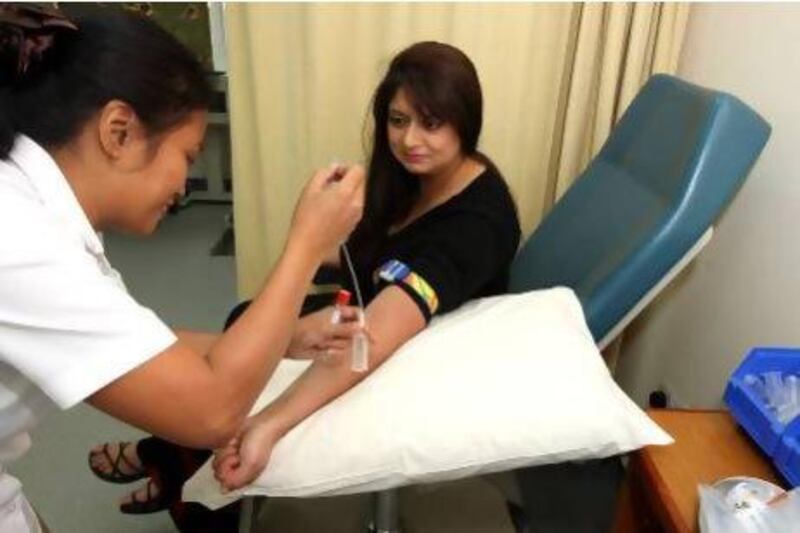I am sitting in a fast-food restaurant casting furtive glances over my shoulder as I greedily wolf down a burger and fries, expecting to be caught out at any moment. It’s a veggie burger, but still. With lashings of cheese, ketchup and grease oozing out, it’s the last thing I should be tucking into.
Yet it feels like a last guilty hurrah before I knuckle down to a sensible eating plan. An hour earlier, I was at the Dubai Herbal and Treatment Centre being tested for any food intolerances and undergoing an abdominal massage in a bid to overhaul my dietary habits and work out how to get my digestive system working better.
The ancient Greeks believed the stomach was the seat of all emotions, storing anger and frustration and regulating energy flow; stress and emotional upset stemmed from the intestines.
And thousands of years of Chinese medicine have taught us anxiety is held in the stomach, which could explain why tense situations often lead to upset tummies.
Those centuries of wisdom are reflected in our language today. Just think of terms in common parlance such as gut feeling, spilling your guts and having the guts to do something and it makes sense.
But are we listening enough to what our guts are trying to tell us? Lily Mueller, a nutritionist at the centre, says not. Our bodies are not designed to break down chemicals, pesticides and all the growth hormones most of the things we eat are full of, she says.
People with digestive problems are likely to have some kind of inflammation in the body. If they suffer from bloating or gas, it is very often diet- or stress-related.
We need to go back to basics and eat food that is recognisable. It is important what you eat as well as how and when you eat it.
I have sought her help after years of feeling uncomfortable with my stomach, which almost always feels bloated and distended after a meal, no matter how small.
If you have ever felt you need to let out your jeans after eating, it could be a sign of something being awry – and not just overeating. Mueller says it is a symptom of the modern world that we are increasingly becoming intolerant of ingredients and additives in our food, which make us feel sluggish and congested.
Gluten, added to numerous prepared foods as a binding agent, is a common one. So is cow’s milk, which the body struggles to digest, while eating too much of the same thing means you can develop an intolerance to something you might not have reacted to before.
And because sugar is furtively added to most processed foods, we crave carbohydrates more than is healthy – then experience problems breaking down the sugars and suffer bloating as a result.
Our grandparents were much more active and ate more fresh fruit and vegetables. These are modern-day problems, says Mueller. She begins the 25-minute abdominal massage by prodding, shaking and kneading my stomach. It feels uncomfortable rather than painful; enough to wince but not leap off the bed.
Mueller presses below my rib cage to detect whether there is inflammation in the small intestine. The widened angle of my ribs tells her there is fermentation in my gut causing the irritation.
The treatment is not diagnostic – only the food intolerance test can identify the cause – but it does pinpoint whether there is a problem while getting your digestive system to work better.
It is about stimulating and energising the digestive system, says Mueller, who adds massages should be done at least twice a week to be effective. It does not, however, solve the root cause.
So to get to the bottom of my dietary issues, I give blood samples and a fortnight later, find myself before Dr Maria Alonso, the centre’s medical director, who is cocking her head to one side in the way a vet might before telling a child her pet poodle is about to be put down.
This is odd: I have had a quick scan of the two pages of results from the 270 foods tested for and there only seem to be three or four on the banned list, including sage (who misses sage?). Surely this is cause for celebration?
Then it slowly dawns on me: the three key foods now ruled off-limits are milk, wheat and eggs, which pretty much covers everything I eat and adore.
Dr Alonso prescribes me a probiotic to kick-start my digestive system and gives me heaps of conciliatory advice on alternatives and where to shop for them. Usually people react to things they like and eat a lot, she says.
I console myself by shopping for cupboard staples at Organic Foods and Cafe in Dubai, filling the trolley as if there is a war on and I am stocking the bunker.
There is a comforting variety of gluten-free alternatives for most things, although it still feels slightly like rationed food. I get a nasty shock when the bill comes to Dh800. Being a special case is clearly not going to be cheap.
A week later, I am cautiously welcoming the new regime. It takes some forward planning and means opting for the grilled fish and fresh fruit rather than pizza and tiramisu when out to dinner.
But after an initial phase of tiredness, my stomach is already a little flatter and I no longer feel bloated and nauseous following a meal. At this rate, I might even bake my own gluten-free bread. One step at a time.
The ImuPro intolerance test costs Dh2,350. Abdominal massages (women only) are Dh150 per session after a Dh350 consultation. Call 04 335 1200 or visit www.dubaihtc.com
Follow us
[ @LifeNationalUAE ]
And follow us on Facebook for discussions, entertainment, reviews, wellness and news.











